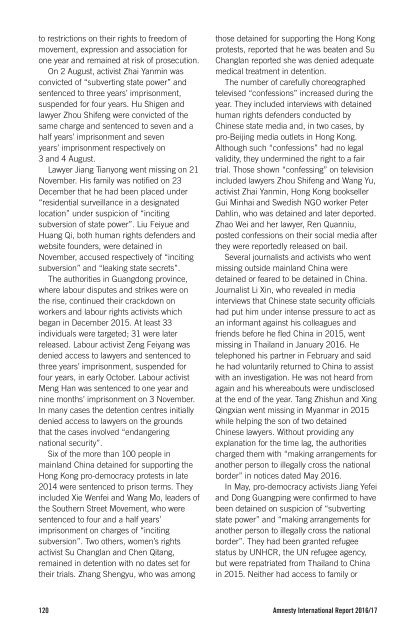AMNESTY INTERNATIONAL REPORT 2016/17
2lEHU9j
2lEHU9j
Create successful ePaper yourself
Turn your PDF publications into a flip-book with our unique Google optimized e-Paper software.
to restrictions on their rights to freedom of<br />
movement, expression and association for<br />
one year and remained at risk of prosecution.<br />
On 2 August, activist Zhai Yanmin was<br />
convicted of “subverting state power” and<br />
sentenced to three years’ imprisonment,<br />
suspended for four years. Hu Shigen and<br />
lawyer Zhou Shifeng were convicted of the<br />
same charge and sentenced to seven and a<br />
half years’ imprisonment and seven<br />
years’ imprisonment respectively on<br />
3 and 4 August.<br />
Lawyer Jiang Tianyong went missing on 21<br />
November. His family was notified on 23<br />
December that he had been placed under<br />
“residential surveillance in a designated<br />
location” under suspicion of “inciting<br />
subversion of state power”. Liu Feiyue and<br />
Huang Qi, both human rights defenders and<br />
website founders, were detained in<br />
November, accused respectively of “inciting<br />
subversion” and “leaking state secrets”.<br />
The authorities in Guangdong province,<br />
where labour disputes and strikes were on<br />
the rise, continued their crackdown on<br />
workers and labour rights activists which<br />
began in December 2015. At least 33<br />
individuals were targeted; 31 were later<br />
released. Labour activist Zeng Feiyang was<br />
denied access to lawyers and sentenced to<br />
three years’ imprisonment, suspended for<br />
four years, in early October. Labour activist<br />
Meng Han was sentenced to one year and<br />
nine months’ imprisonment on 3 November.<br />
In many cases the detention centres initially<br />
denied access to lawyers on the grounds<br />
that the cases involved “endangering<br />
national security”.<br />
Six of the more than 100 people in<br />
mainland China detained for supporting the<br />
Hong Kong pro-democracy protests in late<br />
2014 were sentenced to prison terms. They<br />
included Xie Wenfei and Wang Mo, leaders of<br />
the Southern Street Movement, who were<br />
sentenced to four and a half years’<br />
imprisonment on charges of “inciting<br />
subversion”. Two others, women’s rights<br />
activist Su Changlan and Chen Qitang,<br />
remained in detention with no dates set for<br />
their trials. Zhang Shengyu, who was among<br />
those detained for supporting the Hong Kong<br />
protests, reported that he was beaten and Su<br />
Changlan reported she was denied adequate<br />
medical treatment in detention.<br />
The number of carefully choreographed<br />
televised “confessions” increased during the<br />
year. They included interviews with detained<br />
human rights defenders conducted by<br />
Chinese state media and, in two cases, by<br />
pro-Beijing media outlets in Hong Kong.<br />
Although such “confessions” had no legal<br />
validity, they undermined the right to a fair<br />
trial. Those shown “confessing” on television<br />
included lawyers Zhou Shifeng and Wang Yu,<br />
activist Zhai Yanmin, Hong Kong bookseller<br />
Gui Minhai and Swedish NGO worker Peter<br />
Dahlin, who was detained and later deported.<br />
Zhao Wei and her lawyer, Ren Quanniu,<br />
posted confessions on their social media after<br />
they were reportedly released on bail.<br />
Several journalists and activists who went<br />
missing outside mainland China were<br />
detained or feared to be detained in China.<br />
Journalist Li Xin, who revealed in media<br />
interviews that Chinese state security officials<br />
had put him under intense pressure to act as<br />
an informant against his colleagues and<br />
friends before he fled China in 2015, went<br />
missing in Thailand in January <strong>2016</strong>. He<br />
telephoned his partner in February and said<br />
he had voluntarily returned to China to assist<br />
with an investigation. He was not heard from<br />
again and his whereabouts were undisclosed<br />
at the end of the year. Tang Zhishun and Xing<br />
Qingxian went missing in Myanmar in 2015<br />
while helping the son of two detained<br />
Chinese lawyers. Without providing any<br />
explanation for the time lag, the authorities<br />
charged them with “making arrangements for<br />
another person to illegally cross the national<br />
border” in notices dated May <strong>2016</strong>.<br />
In May, pro-democracy activists Jiang Yefei<br />
and Dong Guangping were confirmed to have<br />
been detained on suspicion of “subverting<br />
state power” and “making arrangements for<br />
another person to illegally cross the national<br />
border”. They had been granted refugee<br />
status by UNHCR, the UN refugee agency,<br />
but were repatriated from Thailand to China<br />
in 2015. Neither had access to family or<br />
120 Amnesty International Report <strong>2016</strong>/<strong>17</strong>


